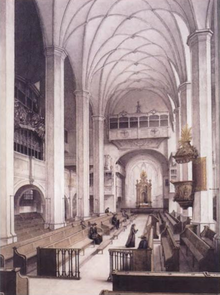Ich elender Mensch, wer wird mich erlösen, BWV 48
| Ich elender Mensch, wer wird mich erlösen | |
|---|---|
| BWV 48 | |
| Church cantata by J. S. Bach | |

Thomaskirche, Leipzig
|
|
| Occasion | 19th Sunday after Trinity |
| Performed | 3 October 1723: Leipzig |
| Movements | 7 |
| Cantata text | anonymous |
| Chorale |
|
| Vocal | |
| Instrumental |
|
Ich elender Mensch, wer wird mich erlösen (Wretched man that I am, who shall deliver me),BWV 48, is a church cantata by Johann Sebastian Bach. He composed it in 1723 in Leipzig for the 19th Sunday after Trinity and first performed it on 3 October 1723.
Bach wrote the cantata in 1723 for the 19th Sunday after Trinity as part of his first annual cycle. The prescribed readings for the Sunday were from Paul's Epistle to the Ephesians, "put on the new man, which after God is created" (), and from the Gospel of Matthew, Healing the paralytic at Capernaum (). The first movement is written on words from Romans 7:24, stressing the need of the sinner for redemption. The unknown poet saw the soul more in need of rescue than the body, affirmed by a chorale as movement 3, verse 4 of the hymn "Ach Gott und Herr" (1604) by Martin Rutilius. After contemplating ideas based on and , he concludes the cantata in hope, expressed in the closing chorale "Herr Jesu Christ, einiger Trost" (Lord Jesus Christ, only comfort), verse 12 of "Herr Jesu Christ, ich schrei zu dir" (Freiburg 1620).
Bach first performed the cantata on 3 October 1723.
The cantata in seven movements is scored for alto and tenor soloists, a four-part choir, trumpet, two oboes, two violins, viola, and basso continuo.
...
Wikipedia
